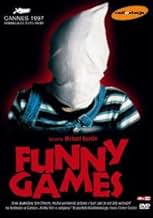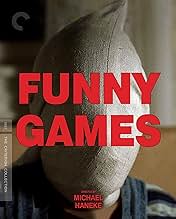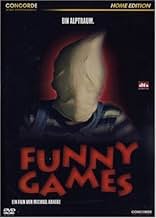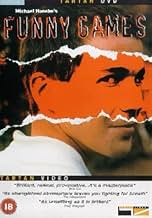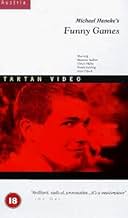Two violent young men take a mother, father, and son hostage in their vacation cabin and force them to play sadistic "games" with one another for their own amusement.Two violent young men take a mother, father, and son hostage in their vacation cabin and force them to play sadistic "games" with one another for their own amusement.Two violent young men take a mother, father, and son hostage in their vacation cabin and force them to play sadistic "games" with one another for their own amusement.
- Awards
- 5 wins & 9 nominations total
- Director
- Writer
- All cast & crew
- Production, box office & more at IMDbPro
Featured reviews
I don't know what to rate this. Although I can appreciate what Haneke was going for, the morally condescending tone didn't work for me. While you could write a book on the topic, I'll keep my thoughts short: humans have a fundamental craving for violence, and I can differentiate violence in media from violence in reality. His message just ended up falling flat. There wasn't any deeper criticism of violence and I didn't walk away feeling wrong or like I should have a new perspective on the matter. Yet I still didn't dislike it... The film was expertly crafted for his intentions, was adeptly acted, and I was kept engaged. Does that make me his target? Is it just pretentiousness? I'm not sure.
6.4/10
6.4/10
I watched this year's remake of "Funny Games" prior to the original, simply because its sick-with-irony trailer got me extremely curious. Granted, this goes against my usual process of viewing a remake's precursor prior to the remake itself, but I couldn't help myself. By the end, I was astonished by writer-director Michael Haneke's audacity in telling a macabre home-invasion story devoid of Hollywood glamour, humor, and mercyremake or no, it's still one of the ballsiest exercises in visceral, reality-based horror ever released by a major studio.
So, when I decided to give the original "Funny Games" a spin (mere days after my viewing of American version), I was filled with presupposition toward how much I would appreciate the original (with the twists of Haneke's shot-for-shot remake still mapped out in my mind)similar to a sadistic "bet" our captors make with their prey, I was wondering if this earlier, German-language version would survive on its own terms. And, while each version is practically identical (save for some subtle nuances in the performances, the slightly varied location design, andof coursethe spoken language), both quite miraculously carry the same visceral, jaw-dropping sucker-punches as the other. Unlike the much-derided American remakes of "The Vanishing" and "Les Diaboliques," Haneke sees no need to let either culture off the hook, especially when each has its own prominent history of violence, on- and off-camera.
Ironically, the references to metalhead couch potatoes Beavis and Butt-Head probably seemed like an incendiary bitch-slap to the passive glamorization of American filmed violence in the 1997 version, but there is an even stronger sense of irony when the MTV-hosted duo are referenced in the remakeon the shores that birthed them, and the cult following of Generation Y-ers that has accumulated in the years since the show's cancellation (a sure sign that our passivity, if anything, is more pronounced now). It's subtle observations like this that give both versions of "Funny Games" an added resonance.
If anything takes some getting used to in the 1997 film, it's the general unfamiliarity of the cast. After seeing a collection of familiar performers run through Haneke's horrifying 2008 experiment, the German cast begins with a studied approach to the performances that eventually loosens into hysteria and desperation that is just as convincing as their remake counterparts. It is truly stunning how Haneke mines the same static framing and intense performances to ends that are equally effective in both films (even knowing the outcome of a protracted long take following a pivotal off-screen event, I found the experience just as emotionally agonizing to witness).
While it may seem hypocritical to "side" with Haneke (at least in the context his film creates), especially when I patronize (and am prone to enjoying) films that frequently downplay the reality of human suffering, the effect in both versions of "Funny Games" is undeniably powerfulthese are difficult, ugly, and emotionally draining films crafted with undeniable (and remarkably subtle) purpose. If there's any catharsis to be had from them, it will be in the introspection and assessment of your own attitudes toward violence.
So, when I decided to give the original "Funny Games" a spin (mere days after my viewing of American version), I was filled with presupposition toward how much I would appreciate the original (with the twists of Haneke's shot-for-shot remake still mapped out in my mind)similar to a sadistic "bet" our captors make with their prey, I was wondering if this earlier, German-language version would survive on its own terms. And, while each version is practically identical (save for some subtle nuances in the performances, the slightly varied location design, andof coursethe spoken language), both quite miraculously carry the same visceral, jaw-dropping sucker-punches as the other. Unlike the much-derided American remakes of "The Vanishing" and "Les Diaboliques," Haneke sees no need to let either culture off the hook, especially when each has its own prominent history of violence, on- and off-camera.
Ironically, the references to metalhead couch potatoes Beavis and Butt-Head probably seemed like an incendiary bitch-slap to the passive glamorization of American filmed violence in the 1997 version, but there is an even stronger sense of irony when the MTV-hosted duo are referenced in the remakeon the shores that birthed them, and the cult following of Generation Y-ers that has accumulated in the years since the show's cancellation (a sure sign that our passivity, if anything, is more pronounced now). It's subtle observations like this that give both versions of "Funny Games" an added resonance.
If anything takes some getting used to in the 1997 film, it's the general unfamiliarity of the cast. After seeing a collection of familiar performers run through Haneke's horrifying 2008 experiment, the German cast begins with a studied approach to the performances that eventually loosens into hysteria and desperation that is just as convincing as their remake counterparts. It is truly stunning how Haneke mines the same static framing and intense performances to ends that are equally effective in both films (even knowing the outcome of a protracted long take following a pivotal off-screen event, I found the experience just as emotionally agonizing to witness).
While it may seem hypocritical to "side" with Haneke (at least in the context his film creates), especially when I patronize (and am prone to enjoying) films that frequently downplay the reality of human suffering, the effect in both versions of "Funny Games" is undeniably powerfulthese are difficult, ugly, and emotionally draining films crafted with undeniable (and remarkably subtle) purpose. If there's any catharsis to be had from them, it will be in the introspection and assessment of your own attitudes toward violence.
A pair of polite, bland-ish German teenagers encounter a woman, her husband and son in a remote lakeside cottage, then spend the night terrorizing them with "funny games." The set-up is identical to that of Elia Kazan's THE VISITORS, both versions of DESPERATE HOURS, and many other claustrophobic thrillers; but the feeling of the picture is that of a hundred-minute-long extended dance remix of the ear-slicing in RESERVOIR DOGS. The writer-director Michael Haneke has one ace up his sleeve: the handsomer of the two sociopaths is given asides to the camera, on the order of, "You are on their side, aren't you?"
The point of all this, apparently, is that the audience is implicated in the action, because we, as pop-culture consumers, consume torture and protracted murder as entertainment. But there's a flaw in Haneke's logic: the only time we consume torture and protracted murder as entertainment is in recondite European art films like I STAND ALONE, MAN BITES DOG, and FUNNY GAMES.
This is the kind of picture that gets bluenose types all huffy, and prone to pronouncements on the order of, "This is the most repellent movie ever made!" I'll stay off that high horse--but I will say, a few hours after seeing the picture, that there is something singularly loathsome in the hypocrisy of Haneke's coating a suspenseless piece of fictional snuff porn in the sanctimony of its being a Statement on Violence and Media. Haneke makes the victims as dull and uncharacterized as the victors; removes just about any plausible means of escape or table-turning; and subtracts any reason for us to care about the outcome, except our desire not to witness hideous suffering. What's left--an orgy of S&M-like abuse--certainly does make the audience squirm. But so what? So would a videotape of anonymous torture, or the capture and abuse of an animal. FUNNY GAMES doesn't exist on a political or philosophical level (like I STAND ALONE); its attempts at mordant humor are collegiate (unlike MAN BITES DOG); it certainly doesn't hold up a mirror to a junk-food culture (like NATURAL BORN KILLERS). It's a wallow. And you know what side the filmmakers are on when one of the sadists terrifies a little kid by slipping on a CD in a neighbor's house the kid has escaped to, and the music is that well-known favorite of middle-aged bourgeois people on vacation...John Zorn and the Naked City.
This kind of Extreme Cinema has worked much better when practiced by artists in totally disreputable sub-pulp forms--like Lucio Fulci and Ruggero Deodato, whose sometimes almost unwatchable films engage in a spiritual wrestling match between the desire to go to the limits, and the conscience that watches over the mayhem. I was shocked to discover that Haneke is nearly sixty--this picture has the sensibility of a kid turned on by the autopsy pictures at Amok Books. As he sticks bamboo under our fingernails, your mind is so unoccupied it asks other questions. Like: Why would any sane family entertain for a minute two young strangers wearing fingerprint-proof gloves in the middle of summer? And: Is the actress playing the mother this terrible because no one else would take such a degrading role?
The point of all this, apparently, is that the audience is implicated in the action, because we, as pop-culture consumers, consume torture and protracted murder as entertainment. But there's a flaw in Haneke's logic: the only time we consume torture and protracted murder as entertainment is in recondite European art films like I STAND ALONE, MAN BITES DOG, and FUNNY GAMES.
This is the kind of picture that gets bluenose types all huffy, and prone to pronouncements on the order of, "This is the most repellent movie ever made!" I'll stay off that high horse--but I will say, a few hours after seeing the picture, that there is something singularly loathsome in the hypocrisy of Haneke's coating a suspenseless piece of fictional snuff porn in the sanctimony of its being a Statement on Violence and Media. Haneke makes the victims as dull and uncharacterized as the victors; removes just about any plausible means of escape or table-turning; and subtracts any reason for us to care about the outcome, except our desire not to witness hideous suffering. What's left--an orgy of S&M-like abuse--certainly does make the audience squirm. But so what? So would a videotape of anonymous torture, or the capture and abuse of an animal. FUNNY GAMES doesn't exist on a political or philosophical level (like I STAND ALONE); its attempts at mordant humor are collegiate (unlike MAN BITES DOG); it certainly doesn't hold up a mirror to a junk-food culture (like NATURAL BORN KILLERS). It's a wallow. And you know what side the filmmakers are on when one of the sadists terrifies a little kid by slipping on a CD in a neighbor's house the kid has escaped to, and the music is that well-known favorite of middle-aged bourgeois people on vacation...John Zorn and the Naked City.
This kind of Extreme Cinema has worked much better when practiced by artists in totally disreputable sub-pulp forms--like Lucio Fulci and Ruggero Deodato, whose sometimes almost unwatchable films engage in a spiritual wrestling match between the desire to go to the limits, and the conscience that watches over the mayhem. I was shocked to discover that Haneke is nearly sixty--this picture has the sensibility of a kid turned on by the autopsy pictures at Amok Books. As he sticks bamboo under our fingernails, your mind is so unoccupied it asks other questions. Like: Why would any sane family entertain for a minute two young strangers wearing fingerprint-proof gloves in the middle of summer? And: Is the actress playing the mother this terrible because no one else would take such a degrading role?
In this cross between Who's Afraid Of Virginia Woolf and A Clockwork Orange, two insolent young psychopaths torment a vacationing family.
It was hard to organize my thoughts on this movie, never mind rating it. As a thriller, this is a tense, well-acted, and relentless experience, marred only by a contrived sequence two-thirds through in which characters behave in unbelievably stupid fashion. However, said sequence is preceded by an incredibly effective ten-minute take. Unusually lengthy takes are often deemed self-indulgent, but this one is anything but.
As an ideological statement, though, this film is a failure. And there is no doubt that writer-director Michael Haneke is trying to make a statement. By having one of the psychos address the camera a few times, saying things to the effect that they have to give the viewers their money's worth, Haneke is essentially wagging his finger at anyone who has ever enjoyed the portrayal of violence in a film. This theme is certainly open to debate, but the problem is that Haneke expresses it in such a condescending way. His harrowing treatment of violence already serves as an excellent counterpoint to other films that glamorize it. There was no need to then leave viewers feeling as though they'd just been lectured by a stern parent.
The last time a filmmaker made me angry, it was when I saw Independence Day, and it was for the same reason. In both cases, the writer and the director display contempt by assuming their audiences are idiots. My anger didn't really ignite, though, until I watched a short interview with Haneke on the DVD. It made me never want to see another one of his films. The man is disgustingly full of himself.
So why the relatively high rating? Because as pretentious and self-important as Haneke is, he is also very talented. The movie is very effective on an emotional level, and it's possible to watch it while ignoring the director's wrong-headed decisions.
It was hard to organize my thoughts on this movie, never mind rating it. As a thriller, this is a tense, well-acted, and relentless experience, marred only by a contrived sequence two-thirds through in which characters behave in unbelievably stupid fashion. However, said sequence is preceded by an incredibly effective ten-minute take. Unusually lengthy takes are often deemed self-indulgent, but this one is anything but.
As an ideological statement, though, this film is a failure. And there is no doubt that writer-director Michael Haneke is trying to make a statement. By having one of the psychos address the camera a few times, saying things to the effect that they have to give the viewers their money's worth, Haneke is essentially wagging his finger at anyone who has ever enjoyed the portrayal of violence in a film. This theme is certainly open to debate, but the problem is that Haneke expresses it in such a condescending way. His harrowing treatment of violence already serves as an excellent counterpoint to other films that glamorize it. There was no need to then leave viewers feeling as though they'd just been lectured by a stern parent.
The last time a filmmaker made me angry, it was when I saw Independence Day, and it was for the same reason. In both cases, the writer and the director display contempt by assuming their audiences are idiots. My anger didn't really ignite, though, until I watched a short interview with Haneke on the DVD. It made me never want to see another one of his films. The man is disgustingly full of himself.
So why the relatively high rating? Because as pretentious and self-important as Haneke is, he is also very talented. The movie is very effective on an emotional level, and it's possible to watch it while ignoring the director's wrong-headed decisions.
I think this movie attempts something virtually impossible, and probably only a German filmmaker would be interested in this particular problem. Watching film is intrinsically exploitive. Often the cinematic exaggeration of entering personal space results in violence. What about this?
An intelligent exploration of this problem from the viewer's side is "Clockwork Orange." Therapy in that case is forced viewing of a movie, presumably the exploration from the filmmaker's side. This is that movie.
Because it is about itself, it enters into a conspiracy of awareness about itself with the viewer. The intruders wink at the audience. Just before the movie begins the phase where it starts to shape up as a movie, that intruder remarks on it not yet being a movie. At one point, the action is "rewound" to be replayed with a different outcome.
It is all very clear. But the challenge is not to remark on the problem, but to say something interesting or new or useful about it. That may be impossible, at least with normal narrative techniques, so this exercise is something of a waste.
The one interesting thing for me is the white gloves. Most commenters assume this is to avoid fingerprints, which goes against every motive we see. As it is the only noticeable costuming, one must conclude it is to denote the cartoonish element.
Ted's Evaluation -- 2 of 3: Has some interesting elements.
An intelligent exploration of this problem from the viewer's side is "Clockwork Orange." Therapy in that case is forced viewing of a movie, presumably the exploration from the filmmaker's side. This is that movie.
Because it is about itself, it enters into a conspiracy of awareness about itself with the viewer. The intruders wink at the audience. Just before the movie begins the phase where it starts to shape up as a movie, that intruder remarks on it not yet being a movie. At one point, the action is "rewound" to be replayed with a different outcome.
It is all very clear. But the challenge is not to remark on the problem, but to say something interesting or new or useful about it. That may be impossible, at least with normal narrative techniques, so this exercise is something of a waste.
The one interesting thing for me is the white gloves. Most commenters assume this is to avoid fingerprints, which goes against every motive we see. As it is the only noticeable costuming, one must conclude it is to denote the cartoonish element.
Ted's Evaluation -- 2 of 3: Has some interesting elements.
Did you know
- TriviaUlrich Mühe and Susanne Lothar, who play the father and mother, were a couple in real life from this movie until Mühe's death in 2007.
- GoofsWhen Anna and Georg are driving in their car, the reflection of a microphone between the front seats can be seen on the window.
- Crazy creditsThe front credits list "music by" several classical composers and John Zorn. Given the director's outspoken views on modern media, including the "composer" of the hardcore "thrash metal" songs alongside the likes of Handel and Mozart is part of his message.
- ConnectionsFeatured in The Last Days of the Board (1999)
- SoundtracksCara Salva
from 'Atalanta'
Music by George Frideric Handel (as G.F. Händel)
Sung by Beniamino Gigli
Published by EMI DA 1918
Details
- Release date
- Country of origin
- Official site
- Languages
- Also known as
- Juegos divertidos
- Filming locations
- Production companies
- See more company credits at IMDbPro
Box office
- Gross worldwide
- $2,081
- Runtime
- 1h 48m(108 min)
- Color
- Sound mix
- Aspect ratio
- 1.85 : 1
Contribute to this page
Suggest an edit or add missing content

